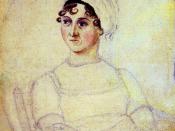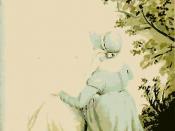It is a characteristic of Jane Austen's work that its extraordinarily amusing, entertaining quality is fused intimately with moral seriousness (which rarely lapses into moralizing), and that she has the manner of assuming the same seriousness in her readers. It has, strangely, been possible for readers and critics in the past to overlook this quality, and to discuss her work as if it offered no more than delicately entertaining studies of the surface of elite society and its trivial doings amidst the costumes and architecture of advertisers' Regency. "One of the more fatuous of several misunderstandings is the complaint that she shows no interest in the great social events of her time - by which it is meant the Napoleonic wars"ÃÂ (White 33). Apart from the doubt whether these national cataclysms are the important social events, the suggestion itself is inaccurate, for Jane Austen's work in fact gives a convincing impression of the impact of public events on the ordinary lives of middle-class people of the time.
"There are the militia and camps, with their effects on the local girls, in Pride and Prejudice; the regular Army as a career in Pride and Prejudice and Emma; still more the Navy as a career, in Mansfield Park and Persuasion, with the use of influential acquaintance to get the midshipman promoted, young men making their fortune from prizes, 'this peace' turning them ashore, the hope of another war to bring further promotion and prize money, their disablement from wounds, the life of their wives and families waiting for and accompanying them, and the jealousy of established families at the sudden social ascent of successful officers"ÃÂ (Canlon 2755). Nor are the wars the only great social events to be reflected in their natural contemporary light. The importance of west Indian estates to English...


